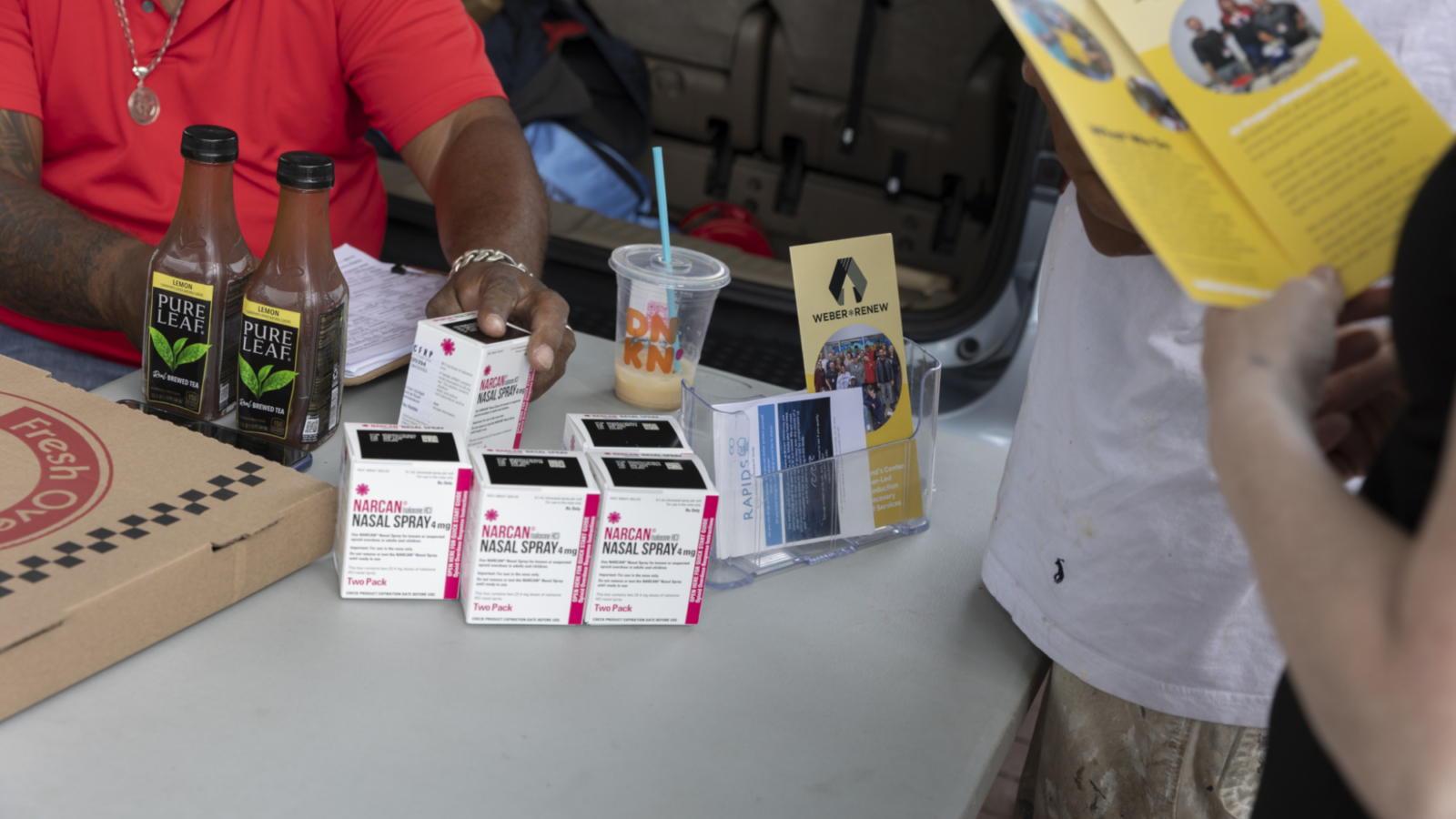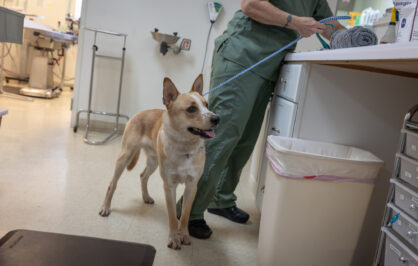
Comunicado de prensa
Las organizaciones sin ánimo de lucro reciben casi 2,5 millones de dólares para servicios de apoyo y recuperación tras el consumo de opiáceos
La asociación en curso entre la Fundación Rhode Island y la Oficina Ejecutiva de Salud y Servicios Humanos de Rhode Island se financia íntegramente con el dinero del Acuerdo sobre Opiáceos
La Fundación Rhode Island, en colaboración con el Grupo de Trabajo sobre Sobredosis del Gobernador Dan McKee, ha concedido casi 2,5 millones de dólares en subvenciones a 19 organizaciones sin ánimo de lucro que están en primera línea para hacer frente a la crisis de opiáceos en el estado.
"Mi administración se complace en colaborar con la Fundación Rhode Island en este importante programa de subvenciones que apoya nuestro objetivo común de salvar vidas", declaró el Gobernador Dan McKee.
La Fundación recibió 59 solicitudes de financiación. Las subvenciones se financian íntegramente con los ingresos procedentes del Acuerdo de Liquidación de Opioides del Estado.
"Las consecuencias de esta trágica epidemia se dejan sentir en todos los rincones de nuestro estado. Nos complace contribuir a garantizar que esta financiación crucial se destine a construir un Rhode Island más fuerte y saludable para todos", declaró David N. Cicilline, Presidente y Director General de la Fundación.
Según los datos sobre sobredosis mortales del Departamento de Salud de Rhode Island, 329 personas perdieron la vida por sobredosis accidentales durante 2024, el segundo año consecutivo en que ha descendido el número de muertes. En general, las muertes por sobredosis han disminuido un 25% desde 2022, cayendo a niveles no vistos desde antes de la pandemia de COVID-19.
"Estos datos indican que Rhode Island está mostrando un progreso notable en el objetivo del Plan de Acción 2030 del Gobernador de reducir las muertes por sobredosis en un 30%", dijo Richard Charest, secretario de la Oficina Ejecutiva de Salud y Servicios Humanos.
El anuncio se produce durante el Mes Nacional de la Recuperación de la Administración Federal de Servicios de Salud Mental y Abuso de Sustancias, que promueve y apoya nuevas prácticas de tratamiento y recuperación basadas en pruebas.
"Septiembre es el momento de rendir homenaje a la fuerza, la resistencia y el espíritu inquebrantable de quienes se recuperan de problemas de consumo de sustancias", declaró el Secretario Charest.
La Fundación concedió subvenciones en cuatro categorías: Apoyo a las personas traumatizadas; Apoyo y capital para la recuperación individual, familiar y comunitaria; Prevención juvenil basada en la comunidad; y Cuestiones emergentes.
Apoyo al trauma
Estas subvenciones financiarán el asesoramiento en salud mental de los primeros intervinientes, incluidos los cuerpos de seguridad, el personal médico de urgencias y los intervinientes inter pares, con el fin de ayudarles a hacer frente al impacto emocional de su exposición a la crisis en el trabajo. Las siguientes organizaciones sin ánimo de lucro se repartirán 625.000 dólares en subvenciones.
- 2nd Act Org Inc. en Providence
- Family Service of Rhode Island en Providence
- Strategic Prevention Partnerships en Portsmouth
Family Service of Rhode Island recibió 200.000 dólares para reducir la carga emocional y psicológica que sufren los primeros intervinientes en relación con las sobredosis y muertes por opiáceos. La iniciativa "Safeguarding Those Who Serve" ampliará el acceso a servicios de salud conductual confidenciales y adaptados a los traumas para los agentes del orden, los proveedores de servicios médicos de emergencia, los bomberos y sus familias.
"Los primeros intervinientes se enfrentan a una exposición desproporcionada a traumas, muertes y crisis, lo que contribuye a elevar las tasas de TEPT, ansiedad y agotamiento. A pesar de estos riesgos, muchos no buscan apoyo debido a la estigmatización, los temores en torno a la confidencialidad y el acceso limitado a servicios adaptados a sus necesidades y cultura únicas", dijo Margaret Holland McDuff, Directora Ejecutiva. Proporcionando asesoramiento confidencial fuera de sus lugares de trabajo y apoyo a las familias de los primeros intervinientes en caso de trauma, podemos salvaguardar el bienestar de quienes protegen las comunidades de Rhode Island"
Apoyo y capital para la recuperación individual, familiar y comunitaria
Estas subvenciones apoyarán la programación de organizaciones formadas por personas, familias y comunidades afectadas por la crisis de los opioides o que les prestan servicios. Las siguientes organizaciones sin ánimo de lucro se repartirán 850.000 dólares en subvenciones.
- Centro de Innovación Mujer Latina en Providence
- Clínica Esperanza de Providence
- Families Reaching Into Each New Day en Warwick
- Justice Assistance en Cranston
- Iglesia Metodista Unida de Mathewson Street en Providence
- Sojourner House en Providence
- Thundermist Health Center en West Warwick
- Wellbeing Collaborative en Wyoming
Sojourner House recibió 175.000 dólares para ampliar su programa Peer Recovery Support for Victims of Abuse, que aumenta el capital de recuperación entre los supervivientes de violencia doméstica, agresión sexual y trata de seres humanos que viven con o se están recuperando de un trastorno por consumo de opiáceos (OUD). La subvención financiará el apoyo a la recuperación entre iguales, la asistencia a las necesidades básicas y los servicios holísticos centrados en la familia para un máximo de 60 personas y sus hijos durante un periodo de dos años, e implicará a más de 10.000 personas en programas centrados en la comunidad.
"La drogodependencia y la violencia doméstica están estrechamente vinculadas de forma compleja y se refuerzan mutuamente. Las personas, sobre todo las mujeres, con OUD corren un mayor riesgo de mantener relaciones abusivas debido a la dependencia económica, la estigmatización y el aislamiento social. Las supervivientes de la violencia doméstica pueden recurrir a los opiáceos para automedicarse contra el dolor físico, el trauma, la ansiedad, la depresión o el trastorno de estrés postraumático derivados de los malos tratos", afirma Vanessa Volz, presidenta y directora ejecutiva. "En Sojourner House, utilizamos un modelo que reconoce que algunos comportamientos negativos son adaptaciones de afrontamiento. Nuestra responsabilidad es ayudar a las víctimas a minimizar cualquier impacto negativo de sus circunstancias y comportamientos, para evitar que vuelvan a traumatizarse y apoyar su camino hacia el autoempoderamiento y el bienestar."
Prevención juvenil basada en la comunidad
Estas subvenciones apoyarán los apoyos comunitarios basados en pruebas o fundamentados en pruebas contra el trauma, los servicios de prevención de opioides y las oportunidades de liderazgo para los jóvenes y adultos jóvenes de Rhode Island. Las siguientes organizaciones sin ánimo de lucro se repartirán 700.000 dólares en subvenciones.
- Substance Use and Mental Health Leadership Council of R.I. en Warwick
- Children and Youth Cabinet en Providence
- The Providence Center en Providence
El Children and Youth Cabinet recibió 300.000 dólares para disminuir la incidencia del consumo de opiáceos entre los jóvenes y reducir las disparidades raciales y étnicas en el consumo de opiáceos y sobredosis mediante la aplicación de un enfoque de prevención por niveles, educando a sus cuidadores, profesores y compañeros en la práctica informada por el trauma y la salud mental; y asegurándose de que los jóvenes, las familias y los residentes de la comunidad participan integralmente como expertos en el diseño, selección y aplicación de prácticas de prevención.
"Nuestra visión del éxito consiste en reimaginar el futuro de la prevención del consumo de sustancias para los jóvenes de Rhode Island. Esta visión tiene como núcleo a los residentes de la comunidad. Los residentes deciden, adaptan y dirigen la aplicación efectiva de programas culturalmente específicos y basados en pruebas para los jóvenes y, por lo tanto, logran la equidad en la salud conductual y reducen los trastornos por consumo de opiáceos y los problemas de salud mental", afirma Rebecca Boxx, directora ejecutiva.
Cuestiones emergentes
Estas subvenciones responderán a problemas emergentes en la epidemia de sobredosis. El trabajo puede incluir actividades de divulgación en lugares privados y actividades de divulgación dirigidas a poblaciones desproporcionadamente afectadas o marginadas, como las comunidades de color, las comunidades LGTBQ+ y los ancianos de Rhode Island. Las siguientes organizaciones sin ánimo de lucro compartirán 300.000 dólares de financiación.
- AIDS Care Ocean State en Providence
- Foster Forward en East Providence
- Healthcentric Advisors en Providence
- Refuge Development Center en Providence
- Instituto de Salud Pública de Rhode Island en Providence
Healthcentric Advisors ha recibido 75.000 dólares para desarrollar una iniciativa piloto destinada a dotar a entre 10 y 15 residencias de ancianos de las herramientas, la formación y las alianzas necesarias para prestar una atención eficaz a los residentes diagnosticados de trastorno por consumo de opiáceos (OUD). El trabajo se centrará en el desarrollo y la aplicación de protocolos basados en pruebas sobre el OUD; la formación y certificación de residencias de ancianos preparadas para la recuperación del OUD; y talleres para la colaboración intersectorial y el intercambio de experiencias.
"Las residencias de ancianos de Rhode Island atienden a un grupo demográfico cada vez más numeroso: residentes que viven o se están recuperando de una OUD y que necesitan una atención informada, compasiva y sostenida. Sin embargo, muchas residencias de ancianos siguen sin estar preparadas y vacilan a la hora de admitir a personas con diagnósticos conocidos de OUD. Estados vecinos como Massachusetts y Connecticut han emprendido iniciativas para aumentar la capacidad de los cuidados a largo plazo. Aunque Rhode Island ha avanzado mucho en el tratamiento avanzado en hospitales y entornos comunitarios, las residencias de ancianos siguen siendo un segmento ignorado del continuo asistencial", declaró H. John Keimig, presidente y director ejecutivo de Healthcentric.
La financiación procede de los acuerdos alcanzados por el Fiscal General Peter F. Neronha. Rhode Island ha ejecutado acuerdos nacionales y específicos de Rhode Island sobre opioides con fabricantes, distribuidores, farmacias y consultores que perpetuaron la epidemia de opioides, lo que ha dado lugar a aproximadamente 315 millones de dólares en financiación y medicamentos que salvan vidas para apoyar los esfuerzos estatales y locales para hacer frente a la crisis de opioides de Rhode Island.
"Estamos empezando a ver resultados reales de los 315 millones de dólares que mi Oficina ha recuperado de los que crearon y perpetuaron la epidemia de opioides", dijo el Fiscal General Neronha. "Y eso se debe a que todos y cada uno de los dólares recuperados se destinan directamente a tratar y prevenir el trastorno por consumo de sustancias en Rhode Island. Estos fondos se asignan estratégicamente a las organizaciones y agencias mejor equipadas para ayudar a quienes padecen esta enfermedad, así como para encabezar los esfuerzos de prevención. Desde la ampliación de la capacidad de tratamiento hospitalario y ambulatorio del estado hasta la reducción de las muertes por sobredosis, pasando por todo lo demás, los afectados reciben un apoyo real que les cambia la vida y a menudo les salva la vida. Nuestro enfoque holístico está ayudando a los habitantes de Rhode Island afectados a vivir una vida plena, al tiempo que evita a las familias de Rhode Island la devastación de perder a sus seres queridos. Debemos continuar, y continuaremos, con esta importante labor"
De conformidad con los diversos acuerdos de conciliación, todos los fondos deben destinarse a la lucha contra los opiáceos, incluida la ampliación del acceso a la prevención, la intervención, el tratamiento y la recuperación de los trastornos por consumo de opiáceos. Las prioridades de Rhode Island en materia de prevención son evitar las sobredosis, las muertes por sobredosis y el uso indebido de opiáceos mediante la identificación, el desarrollo y la evaluación de estrategias e intervenciones a varios niveles.
Esta es la tercera ronda de subvenciones financiadas con los ingresos de los acuerdos. Desde 2023, la Fundación ha concedido 7,3 millones de dólares a docenas de organizaciones sin ánimo de lucro para abordar el consumo, el tratamiento y la prevención de los opioides.



